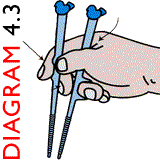Amy E. Parker
3 POEMS
WITHOUT PERSEPHONE
Springing up over the cornfields
I see her lost sheaves—a trick of heat lightning.
St. Elmo's fireflies becalm and blink above the broken grain.
But the earth swallows everything.
Upon the solitary patch of mud
where whorl the last imprints of her naked feet
let it rain potash and all
Let it rain lye and peat and let the potlatch
break me bald. I want to give myself like wheat
I want to be rived and mortared and shriven and gleaned
by the reapers and the blackbirds
clinging to bare stalks. Let threshers take to me with flails.
Sift and spread and scatter me — hay; chaff; seed.
Let the wind comb out my womb
and the tornado wind its screw
into the earth of me and plant
a lighthouse between my knees
to be my beacon scythe.
I will mow the world for her
with light.
__RAPTURE AT 24TH AND GUADELUPE
Do you know consolation?
A door where no door was.
Even those with bad teeth
will be kissed when the time comes.
I would offer a mouthful of roses
for every dead incisor
but at the now, the best I can do
is sit alongside without shrinking
and meet your eyes.
Mine aren't kind. Just open.
To the Baba Yagas, and the mad
whose hands are butterflies, blackened
at the quicks, who dare to speak
to indifferent girls on stoops
you shall be changed
and what's more—spared.
If your stomach is a wax balloon
above sprung boots or if
you are beautiful as a fish
and as terrified to blink
I am for you.
Put your hand over mine.
Turn the knob.
It is warm. Pass through.
GEORGIA AND ALFRED
Alfred saw her beauty
hatch its own source of light.
Georgia perforated the dark.
She painted cityscapes—night shapes bending electric
beams of color.
Alfred shot her black and white.
Her image spilled
into stillness and set.
In her studio, Georgia turned away from the human face.
"The subject," she said, "gets old."
Alfred buried his head in the hot velvet skirt
of the camera, set his eye to the slit.
"Stand there. No, sit.
"Loosen your hair. Unbind your breasts.
"I want to catch you
defenseless."
She raised her chin.
Alfred sized her in the pinhole.
In the red light of his dark room
Georgia's breasts glow
faint, grow firm, resolve
—two tender globes
that will drop and dry up.
Alfred turns her in the basin,
handles her by the edges
with tongs.
Alfred's prints show Georgia's body
take its own photo of years.
Light etches lines
and her skin draws itself over her bones.
Georgia paints what blazes and fades:
the constant stones, the sky,
the sealed horizon of a jack-in-the-pulpit,
the heart of a rose.
Alfred adjusts his shutter speed;
Georgia leans out her car window and fixes him
with a look before passing
out of frame.
Alfred knows passed away is no euphemism—
it is a tragedy to which every click of camera
says: 'Hold'. Georgia's light grows,
a flood only the desert can catch without danger
of being overexposed.
Left alone, Alfred squares her
in the chemical bath
then strings her up.
A pelvis, knuckles, her eyebrows and nose—
She flutters pointlessly, a series of prayer-flags, or debris
(hair, rags, fleece) snagged and blown
on a bobwire fence —no—just a row
of silver-gelatin headstones.
In the desert, Georgia paints an arc of pelvic bones.
____
on "Without Persephone": When I lived in Indiana I always wanted to see a lighthouse in the middle of a cornfield. I love the Greeks. They understood loss better than anyone.
on "Rapture at 24th and Guadelupe": There are a lot of saints at bus stops.
on "Georgia and Alfred": I tore Stieglitz's last photo of O'Keeffe out of a newspaper. A man I knew said she was the only woman he could think of who looked better at 80 than at 18. I went through the entire Stieglitz series, and the later portraits of her by other photographers, to see if I agreed. What emerged was this poem; two voices talking to me about the death of love and the difference between men and women, painting and photography, impermanence and the need to make things stay.
